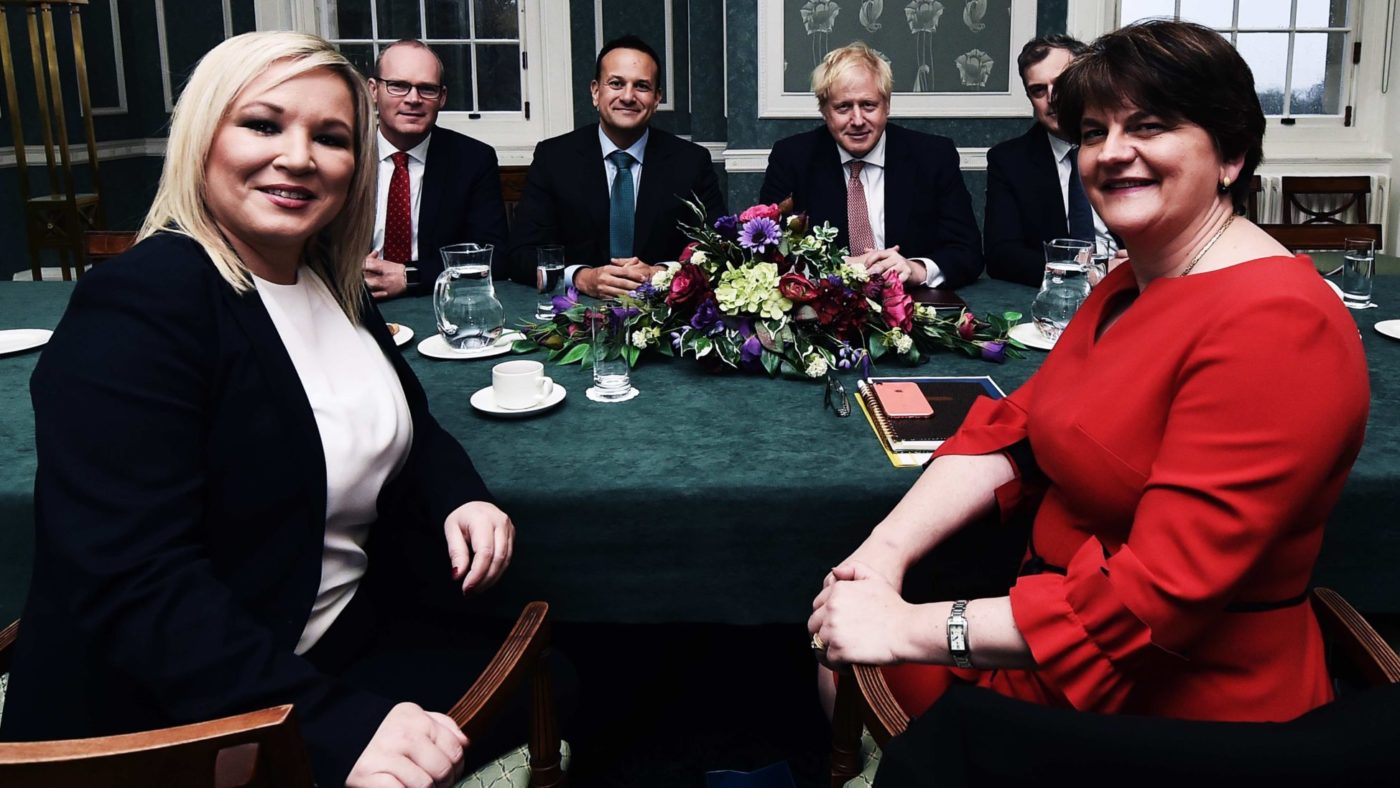Northern Ireland’s legislative assembly sat for one full day before the sense of optimism that accompanied its restoration started to diminish.
For three years, the devolved institutions at Stormont didn’t operate, as Sinn Fein refused to share power with the DUP following a ‘cash for ash’ scandal over a renewable heating scheme. In January 2017, the deputy first minister, Martin McGuinness, resigned in apparent protest at Arlene Foster’s refusal to step aside as first minister while the RHI debacle was investigated.
That pretext was quickly swept aside, as Sinn Fein compiled a shape-shifting list of demands it insisted must be satisfied if it were to retake its seats in the devolved executive, which is formed on the basis of ‘mandatory coalition’ between unionist and nationalist parties.
Last week, Sinn Fein and the DUP finally endorsed an agreement to restore the institutions, called New Decade, New Approach. The document, published jointly by the British and Irish governments, requires republicans to make some compromises on their ‘red lines’, but it asks unionists to accept measures they find deeply unpalatable. The parts of the text dealing with Northern Ireland’s most intractable problems, the ones that have caused power-sharing to collapse repeatedly, are shrouded in ambiguity.
Nevertheless, the Assembly ended its long period of inactivity with an unusual Saturday sitting. Understandably, the atmosphere was upbeat, but expressions of goodwill and conciliation lasted only until Monday. By the time Boris Johnson and Leo Varadkar arrived to bathe in the afterglow of a successful deal, tensions were beginning to re-emerge.
First, the DUP’s new agriculture minister, Edwin Poots, suggested that improvements to the province’s crumbling water infrastructure might be financed by introducing water charges. Northern Ireland is the only part of the UK where separate water rates are not levied. That suggestion was publicly shot down, first by Sinn Fein’s Michelle O’Neill, then by Poot’s own party leader, Arlene Foster.
Meanwhile, the Prime Minister disappointed the parties by refusing to commit to billions of pounds of extra funding for public services, which they apparently expected as a reward for getting back to work. The executive’s incoming finance minister, Sinn Fein’s Conor Murphy, who was convicted of IRA membership and possession of explosives in the 1980s, told Channel 4 News that another £2 billion from Westminster “wouldn’t look at’ Stormont’s requirements”.
Mrs Foster and Ms O’Neill, the new first and deputy first ministers, issued a statement insisting that, now an agreement had been reached, “funding must follow”. With typical directness, unionist MLA Jim Allister, the only Stormont representative who refused to support the new deal, asked: “What kind of dope would sign a deal where money is key without knowing the amount that will be delivered?”
On Twitter, the Belfast News Letter’s respected politics editor, Sam McBride, referred to the executive’s “inauspicious start” and suggested the DUP and Sinn Fein had “signed up to a gargantuan wishlist without knowing how it would be funded.”
The agreement certainly seems to entail substantial public spending.
During three years of on-off negotiations, Sinn Fein’s insistence on an Irish Language Act was the most persistent barrier to reaching a deal. In New Decade, New Approach, the party did not get the standalone act it demanded, but it did get a new Irish language commissioner and official status for Gaelic. This forms part of a suite of culture and language legislation, that also creates a commissioner for Ulster-Scots and an Office of Identity and Cultural Expression.
Northern Ireland already has a huge public sector, including an absurd number of commissions, ombudsmen and arm’s length bodies for such a small region. Traditionally, Conservatives argued that its size impaired the province’s economy, crowding out the private sector. The creation of yet more commissioners and offices, particularly when they reinforce an unhealthy preoccupation with culture and identity, is unlikely to encourage a rebalancing toward private enterprise.
The DUP and Sinn Fein were pressured into a deal, partly because they suffered disappointing election results, but also because the health service in Northern Ireland is crippled by strikes and the UK’s longest waiting lists. The executive has already agreed to resolve the industrial dispute, by restoring pay parity with the rest of the UK for staff. It also expects to spend substantial sums on schools and infrastructure.
These commitments might be sustainable if ministers accept genuine shared responsibility for their budget and implement badly needed reforms, that may involve unpopular decisions like closing hospitals and schools. Unfortunately, there’s little in the deal that suggests Northern Ireland’s devolved government is likely to work any better in the future or even that it won’t collapse again relatively quickly.
A major strand of the agreement is supposed to make sure the institutions are “more resilient” and avoid fresh impasses. There are measures aimed at ensuring the ‘petition of concern’, which effectively gives the DUP and Sinn Fein vetoes in key votes, is used less frequently. Conspicuously, there is nothing to prevent one of the parties from pulling down power-sharing again, other than an extended cooling-off period before an election is triggered.
During the Assembly’s fractious second day, Sinn Fein’s Declan Kearney, the party’s ‘national’ chairman and a newly appointed junior minister, told RTE that the deal to restore power-sharing would act as a ‘beachhead’ to an all-Ireland republic. The DUP insists that it is good for Northern Ireland’s place in the UK and it won’t tolerate any moves toward a 32-county state.
These completely incompatible analyses don’t necessarily mean they can’t work constructively together on health, education and the economy. But nothing in this deal and nothing in Stormont’s turbulent past suggests that another crisis isn’t lurking just around the corner.
Click here to subscribe to our daily briefing – the best pieces from CapX and across the web.
CapX depends on the generosity of its readers. If you value what we do, please consider making a donation.


